![]() NEW
FINDING-- ATHENA GUIDES OUR SOUL ("psuche"),
LINKED TO SPIRIT
NEW
FINDING-- ATHENA GUIDES OUR SOUL ("psuche"),
LINKED TO SPIRIT
1- psuche
is spelled as follows in ancient Greek:

2- Homer
first used psuche to describe "ghosts" in Hades:
![]()
The Odyssey- Book 24, line 35
3- Plato
uses pusche to describe Soul, Athena guided men's Souls:
Critias 109b,c,d --Athena
guides our Souls (see footnote
48- Plato's works)
Once upon a time the gods were taking over by lot the whole earth according
to its regions,...and they settled their countries; and when they had thus settled
them, they reared us up, even as herdsmen rear their flocks, to be their cattle
and nurslings; only it was not our bodies that they constrained by bodily force,
like shepherds guiding their flocks with stroke of staff, but they directed
from the stern where the living creature is easiest to turn about, laying hold
on the soul by persuasion, as by
a rudder, according to their own disposition; and thus they drove and steered
all the mortal kind. Now in other regions others of the gods had their allotments
and ordered the affairs, but inasmuch as Hephaestus and Athena
were of a like nature, being born of the same father, and agreeing, moreover,
in their love of wisdom and of craftsmanship, they both took for their joint
portion this land of ours as being naturally congenial and adapted for virtue
and for wisdom, and therein they planted as native to the soil men of virtue
and ordained to their mind the mode of government.
theoi gar hapasan gên pote kata tous topous
dielanchanon...
kai katoikisantes, hoion nomês poimnia, ktêmata kai thremmata heautôn
hêmas etrephon, plên ou sômasi sômata biazomenoi, kathaper
poimenes ktênê plêgêi nemontes, all' hêi malista
eustrophon zôion, ek prumnês apeuthunontes, hoion oiaki peithoi
psuchês ephaptomenoi kata tên
autôn dianoian, houtôs agontes to thnêton pan ekubernôn.
alloi men oun kat' allous topous klêrouchêsantes theôn ekeina
ekosmoun, Hêphaistos de koinên kai Athêna
phusin echontes, hama men adelphên ek tautou patros, hama de philosophiai
philotechniai te epi ta auta elthontes, houtô mian amphô lêxin
tênde tên chôran eilêchaton hôs oikeian kai prosphoron
aretêi kai phronêsei pephukuian, andras de agathous
empoiêsantes autochthonas epi noun ethesan tên tês politeias
taxin:
Timaeus 42d -- Athena/Hephaestus
(young gods) guide Souls:
He delivered over to the young gods the task of molding mortal bodies, and of
framing and controlling all the rest of the human soul
which it was still necessary to add, together with all that belonged thereto,
tous d' eis talla hosa organa chronou: to de meta ton sporon tois neois paredôken theois sômata plattein thnêta, to t' epiloipon, hoson eti ên psuchês anthrôpinês deon
Timaeus 34c -- Soul rules
body
God, however, constructed Soul to be older
than Body and prior in birth and excellence, since she was to be the mistress
and ruler and it the ruled;
ho de kai genesei kai aretêi proteran kai presbuteran psuchên
sômatos hôs despotin kai arxousan arxomenou
Timaeus 70a --Soul relates
to courage, spirit
That part of the soul,
then, which partakes of courage and spirit, since it is a lover of victory,
they planted more near to the head,
to metechon oun tês psuchês
andreias kai thumou, philonikon on, katôikisan enguterô tês
kephalês metaxu tôn phrenôn te kai auchenos,
4- Athena breathes Soul into first man
"The creation of mankind. Prometheus is holding a man whom
he created; Athena breathes soul
into him in the form of a
butterfly." [Sarcophagos 270 A.D., Musee Capitolina]-see footnote 49
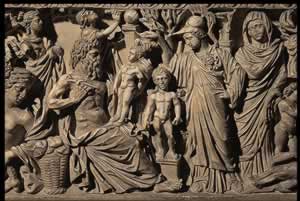
Rome, Museo Capitolino- see footnote 50
5- Proclus (412-485
CE) prays to Athena to save his soul-
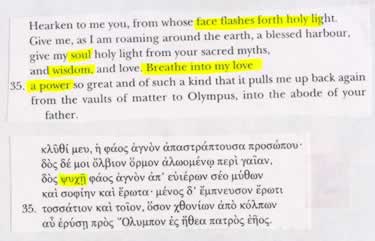
Hymn to Athena-
Proclus' Hymns- Berg,
R.M. van den (Rudolphus Maria), 1940 pp. 276-278
6- Orphic Hymn 28 to
Athena--she inspires Souls

English translation
by Thomas Taylor- see footnote 51
Greek translation Hymnes & Discours- Sacres p. 100
Thus Athena guides mens souls (psuche)
7- Biblical references:
God ( I believe this to
be Divine Wisdom ) breathes soul into man:
(Genesis 2:7 Septuagint)

Divine Wisdom guided Adam
(Wisdom 10:1 Septuagint)

Divine wisdom guides souls
: (Ecclus 51: 13-28 Septuagint)
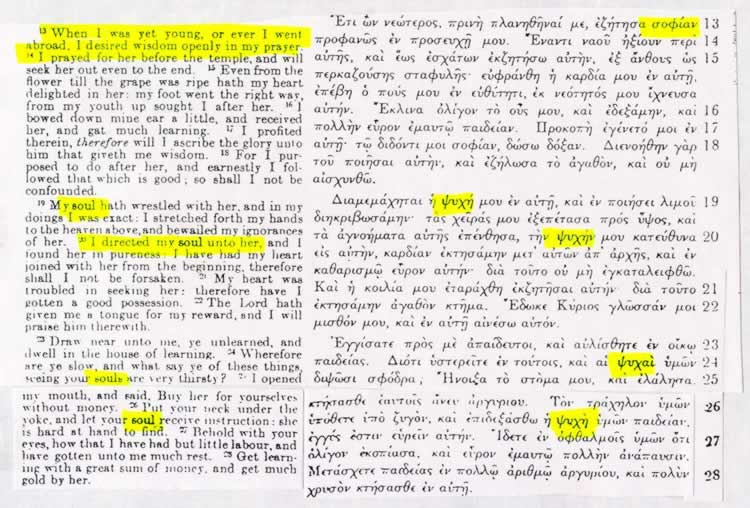
Thus we see both Athena & Divine Wisdom Guide Souls.
Divine Wisdom is "of
the same substance" as psuche/Soul -

Ecclesiasticus 24: 1-4 ---Septuagint
St Augustine claims psuche
is "their spirit" (the pagan spirit), not the Holy Spirit. He acknowledges
that psuche is "of the same substance" as Divine Wisdom when he quotes
Ecclus 24:3 (see above)
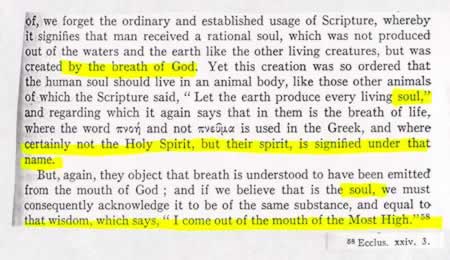
St Augustine makes a
distinction between "their spirit" and the Holy Spirit.
City of God
by Saint Augustine, Book 13, Chap 24, p. 439
St Augustine recognizes
Soul of nature as the third part of the
Platonic Trinity, which he refers to as the Holy Spirit.
"For Plotinus
places the soul of nature after the intellect
of the Father, while Porphyry, making it the mean, does not place it
after, but between the others. No doubt he spoke according to his light, or
as he thought expedient; but we
assert that the Holy Spirit is the Spirit not of the Father only, nor of the
Son only, but of both."
"The Platonists of
the Alexandrian and Athenian schools, from Plotinus to Proclus, are at one
in recognizing in God three principles or hypostases: 1st, the One or the
Good, which is the Father; 2nd, the Intelligence or Word, which is the Son;
3rd, the Soul, which is the universal
principle of life. But as to the nature and order of these
hypostases, the Alexandrians are no longer at one with the school of Athens."
The
City of God, Book X, Chapter 23
This
Soul of nature is Athena/psuche
"Their spirit" (psuche/Divine wisdom) differs from Holy Spirit (pneuma)-
The Holy Spirit (pneuma)
did not exist prior to the Christian era according to Jesus (John 7:39):
(see footnote 52- New Testament
for Biblical texts English & Greek)
[39] But he
said this about the Spirit, which those
believing in him were to receive. For the Holy Spirit
was not yet given,
because Jesus wasn't yet glorified.
[39] Touto de eipen peri tou pneumatos
hou emellon lambanein hoi pisteusantes eis auton: oupô gar ên pneuma,
hoti Iêsous oupô edoxasthê.
St Paul differentiates
between the first Adam (psuche) and the second Adam (pneuma) in 1 Cor 15:45:
[45] So also it is written, "The
first man, Adam, became a living soul."
The last Adam became a life-giving spirit.
[45] houtôs kai gegraptai Egeneto ho prôtos
anthrôpos Adam eis psuchên zôsan:
ho eschatos Adam eis pneuma
zôopoioun.
psuche/Divine Wisdom was the pagan "their spirit" referred to by St Augustine. This force actively guided men's Souls, as exemplified by Athena and her resurrection of Odysseus' life in The Odyssey.
Holy Spirit (Counselor)-
as defined by Jesus in John 14:26- replaced "their spirit":
[26] But the Counselor, the Holy
Spirit, whom the Father will send in my name, he will teach you all
things, and will remind
you of all that I said to you.
ho de paraklêtos, [26] to pneuma
to hagion ho pempsei ho patêr en tôi onomati mou, ekeinos humas
didaxei panta kai hupomnêsei humas panta ha eipon humin egô.
Thus the guide of Souls (Athena/Divine Wisdom) was repaced by the Counselor (Holy Spirit).
I believe Constantine's original Holy Ghost was the pagan "their spirit" of Athena/Divine Wisdom
Backup 5
![]() 527-565
CE- CHRISTIAN ROMAN EMPEROR JUSTINIAN (RULING FROM CONSTANTINOPLE) EMBRACED
CLASSICAL GREEK THINKING---he built the magnificant church Hagia Sofia (Divine
Wisdom) in Constantinople which was described at the time using thinly veiled
references to Athena.
527-565
CE- CHRISTIAN ROMAN EMPEROR JUSTINIAN (RULING FROM CONSTANTINOPLE) EMBRACED
CLASSICAL GREEK THINKING---he built the magnificant church Hagia Sofia (Divine
Wisdom) in Constantinople which was described at the time using thinly veiled
references to Athena.
"In time, however, Christian thinkers began to realize that there was much
to be carried over into Christian
teaching from the Classical Greeks. Socrates and Plato, for example,
often seemed to approximate Christian thought...
However, the fathers of the Christian Church and other later thinkers had the
insight to perceive that it was possible to make some basic distinctions, and
separate those elements from classical literature that were not in accord with
Christianity, keeping all the rest...
This conviction brought about the establishment of a "new" Christian
culture, one utilizing all the best writings of the
classical Greek thought and fusing it into the writings and teachings of the
Orthodox Church. The process of such a fusion took centuries, and its final
step was not to be completed till the age of Justinian...
Justinian decided to put an end to the idea of Paganism as heresy. He
saw, however, that there was a major problem in the manner in which Pagan writing
was being taught in the schools and universities. In particular, it was being
taught in two different ways.
In the schools of Constantinople, Gaza and Alexandria, the classics were being
taught by teachers who were themselves
Christians...
One center of learning that even until Justinian's time had never associated
itself with Christianity was Athens. There the
professors were still Pagan and were teaching the classics from entirely the
Pagan point of view. This was found
unacceptable. Not the fact that they were teaching classical works, but that
they were themselves not Christians. Justinian
gave them the opportunity to become Christian but they refused. As a result
Justinian closed down their schools in 529, his second year as emperor...
Constantinople produced a number of distinguished literary figures in
Justinian's time. Many of their works were largely influenced by the teachings
of Aristotle, Plato and other ancient Greek philosophers and play writers,
whom they had all studied...
Paul the Silentiary was also in this list of distinguished scholars at the
time of Justinian..."
(see footnote 36)
562 CE---PAUL THE SILENTIARY WROTE IN THE STYLE OF HOMER IN PRAISE OF
JUSTINIAN'S NEW CHURCH AGIA SOPHIA (DIVINE WISDOM)---USING THINLY VEILED
REFERENCES TO ATHENA:
Paul wrote in the style of Homer. "He wrote a famous description of St.
Sophia in 887 hexameters, about the
length of one of the longer books of Homer. Homer became the vehicle for the
praise of the noblest church in the empire. Paul's monograph on Agia Sophia
reflects a real Christian feeling via the subtlety and similes of the Homeric
style."
(see footnote 37)
"The poem was recited at the second dedication of the church (A.D. 562),
in the episcopal hall of the patriarchate."
(see footnote 38)
"Paul the Silentiary wrote encomium [hymn of praise] The Magnificence of
Hagia Sophia, which became famous..."
(see Paul's poem below--see footnote 39)
(Note below the thinly veiled references to Athena Goddess of Wisdom, frequently
portrayed wearing a helmet,
known as "the protector of the city", and also to the Homeric echo
of Odysseus in his wanderings in the
Aegean.)
"Above all rises into the immeasurable air the great helmet [of
the dome], which, bending over, like the radiant heavens,
embraces the church. And at the highest part, at the crown, was depicted the
cross, the protector of the city. And
wondrous it is to see how the dome gradually rises wide below, and growing less
as it reaches higher. it does not however
spring upwards to a sharp point, but is like the firmament which rests on air,
though the dome is fixed on the strong backs of the arches....
A thousand others [lamps] within the temple show their gleaming light,
hanging aloft by chains of many windings.
Thus through the spaces of the great church come rays of light, expelling clouds
of care, and filling the mind with joy. The
sacred light cheers all: even the sailor guiding his bark on the waves,
leaving behind him the unfriendly billows of the
raging Pontus, and winding a sinuous course amidst creeks and rocks, with heart
fearful at the dangers of his nightly
wanderings-perchance he has left the Aegean and guides his ship against
adverse currents in the Hellespont, awaiting with taut forestay the onslaught
of a storm from Africa-does not guide his laden vessel by the light of Cynosure,
or the circling Bear, but by the divine light of the church Itself. Yet not
Only does it guide the merchant at night, like the rays from the Pharos on the
coast of Africa, but it also shows the way to the living God."
(see footnote 39)
[NEW
DATA]-- Jewish-Hellenic Biblical writers incorporated Homer's
Odyssey directly into the Wisdom of Solomon.
Athena, Greek goddess of wisdom, who played
such a key role in saving Odysseus in the Odyssey, now reappears as Divine
Wisdom in the Jewish-Hellenic Wisdom texts.
I believe
certain passages in
Wisdom 4:10-5:22 in the Septuagint were"borrowed"
from Homer's Odyssey (written 800 BC).
The Book of Wisdom
(one of the books of the Apocrypha in the Septuagint) was written in Greek by
an Alexandrian Jew a short while before the Christian era.
These passages describe a "righteous man" in Wis. 4:10-11,
which my New English Bible suggests could be Enoch, and refers the reader
to Gen. 5:21-24. I also located Enoch references in Sir. 44:16, Hebrews 11:5,
and in the second century B.C.E. non-canonical apocryphal Book of Enoch.
The action described relating to the "righteous man" in the Septuagint
Wis. 4:10-5:22
matches neither the Enoch references in the Bible nor in the Book of Enoch.
But the action described in Wis. 4:10-5:22 does match Odysseus of The
Odyssey.
Here are my
findings in the Septuagint, written before the Christian era.
Clearly, these passages show the Homeric influence.
"He pleased God, and was beloved of him: so that
living among sinners he was translated. Yea, speedily was he taken away, lest
that wickedness should alter his understanding, or deceit beguile his soul.
For the bewitching of naughtiness doth obscure things that
are honest: and the wandering of concupiscence doth undermine
the simple mind. He, being made perfect in a short time, fulfilled a
long time: for his soul pleased the Lord: therefore hasted he to take him
away from among the wicked." Wis.4:10-14
This passage directly echoes Odysseus being saved
by Athena from the clutches of Calypso/Circe and other temptations on his long
voyage home.
"Then
shall the righteous man stand in great boldness before the
face of such as have afflicted him, and made no account of his labours.
When they see it, they shall be troubled with terrible fear,
and shall be amazed at the strangeness of his salvation, so far beyond
all that they looked for. And they repenting and groaning for anguish of spirit
shall say within themselves,
This was he, whom we had sometimes in derision, and a proverb
of reproach: we fools accounted his life madness, and his end to be without
honour: how is he numbered among the children of God, and his lot
is among the saints!" Wis.5:1-5
This passage also describes Odysseus confronting the suitors, putting fear in
their hearts.
My New English Bible states: "...at the sight of
him there will be terror and confusion, and they will be beside themselves to
see him so unexpectedly safe home." Wis.5:2
Is this not Odysseus returning to his great hall and confronting
the suitors?
"But
the righteous live for evermore; their reward also is with the Lord, and care
of them is with the most High. Therefore shall they receive a glorious kingdom,
and a beautiful crown from the Lord's hand: for with his right hand shall he
cover them, and with his arm shall he protect them. He shall take to him his
jealousy for complete armour, and make the creature his weapon for revenge of
his enemies. He shall put on righteousness as a breastplate,
and true judgment instead of an helmet.... Then shall the right aiming
thunderbolts go abroad; and from the clouds, as from a well drawn bow, shall
they fly to the mark." Wis.5:15-19, 21
This passage describes the dispatching of the suitors
by Odysseus and Athena. Athena is the only god with direct access to Zeus' thunderbolts.
I do not believe there are any references to thunderbolts in the Jewish Old
Testament.
"Unto you therefore, O Kings, do I
speak, that ye may learn wisdom, and not fall away...Wisdom
is glorious, and never fadeth away: yea, she is easily seen of them
that love her, and found of such as seek her". Wis.6:9 & 12.
"...she shall lead me soberly in my doings, and preserve
me in her power." Wis 9:11
These passages describe Athena, goddess of wisdom
and follows closely after the Odyssey passages quoted earlier.
Locating Homer's Odyssey written into Wisdom 4:10-5:22 is a startling new finding, as, according to Google, no scholars have published articles that have made this connection before.
Statement 8
![]() Athena
appears in Catholic Church fresco (although labelled otherwise by locals)
Athena
appears in Catholic Church fresco (although labelled otherwise by locals)
The Catholic Church of Maria de Victoria, Ingolstadt, Bavaria, Germany has
an interesting group of frescoes as described by Thomas Schipflinger in his
book SOPHIA-MARIA. A HOLISTIC VISION OF CREATION. Schipflinger states on page
183: "Its frescoes were painted by Cosmas Damien Asam in 1734. The ceiling
fresco in the entrance hall portrays Wisdom sitting on a throne amidst royal
insignia... Depicted as a Queen, Sophia carries a staff and also a scepter in
the form of a snake...The scepter in the form of a snake symbolizes Sophia's
healing and salvation-bringing power (the snake is a symbol of Wisdom and healing)."
[Please note snake with Athena in Parthenon statue- see top]
"The entrance hall fresco represents a kind of "prologue" to
the ceiling fresco inside the church... There one sees a beam of light descending
from God the Father to a woman dressed like Sophia in the entrance hall painting...
From Her another beam descends down to Mary, who is kneeling in assent to the
message that She is to be the Mother of God... It is further interesting to
note that the beam of light reflected to Mary is in turn reflected by Her down
to... Pallas Athena, the Greek goddess of Wisdom..." (see subject
fresco below)
Verlag Donau Kurier in his book COSMAS DAMIEN ASAM. MARIA DE VICTORIA. INGOLSTADT
comments on page 105 (translated from German) below a picture of Athena: "Hit
by the holy beam of light: Pallas Athene, Europe..."
The nearby copy reads: "The Jesuit description from 1735 in view of the
woman in Pallas' golden armour... She is identified as Pallas by her
armour and helmet. Pallas is the goddess of Wisdom, Mary as the seat
of Wisdom is also in this respect the saintly Pallas. Pallas and Minerva
were, in antiquity and the baroque period, quite often identified with one another.
Minerva also represents Wisdom, but also faith, justice, innocence, grace, and
devotion to Mary..." (see subject fresco below)
KEY 1735 STATEMENT--"PALLAS IS THE GODDESS OF WISDOM, MARY IS THE SEAT
OF WISDOM"
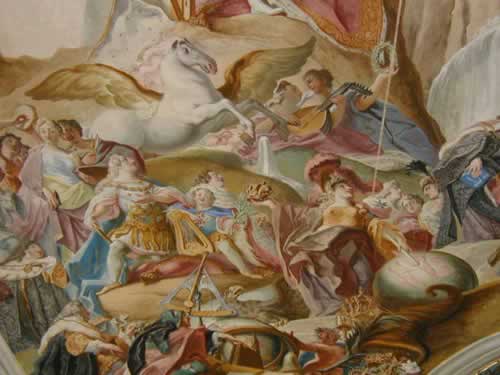
Copyright of "Kurt Scheuerer, Ingolstadt,
Bavaria" and: kurt@scheuerer-ingolstadt.de
I believe this 1734 painting also depicts the Duke of Bavaria Charles VII with
his 7 year old son Maxmillian III Joseph.
It appears Athena is passing the crown their direction.
25 years later the son was involved in the dedication of the Bavarian Academy.
Athena appears again.
"Dedication of volume I of the Proceedings (1763). On the left a
portrait of Elector Maximilian III Joseph; on the right, Pallas Athene
holding the 'heart-shield' (inescutcheon) with the motto 'Tendit ad
aequum' granted to the Academy by the Elector, and, below, the date of
foundation, 28th March 1759."
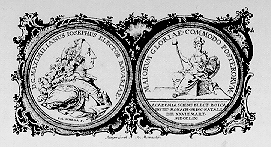
The Elector in 1759 looks like his father in the 1734 Maria de Victoria painting. This appears on a German web site covering the dedication of The Bavarian Academy in 1759 (see Footnote 47)